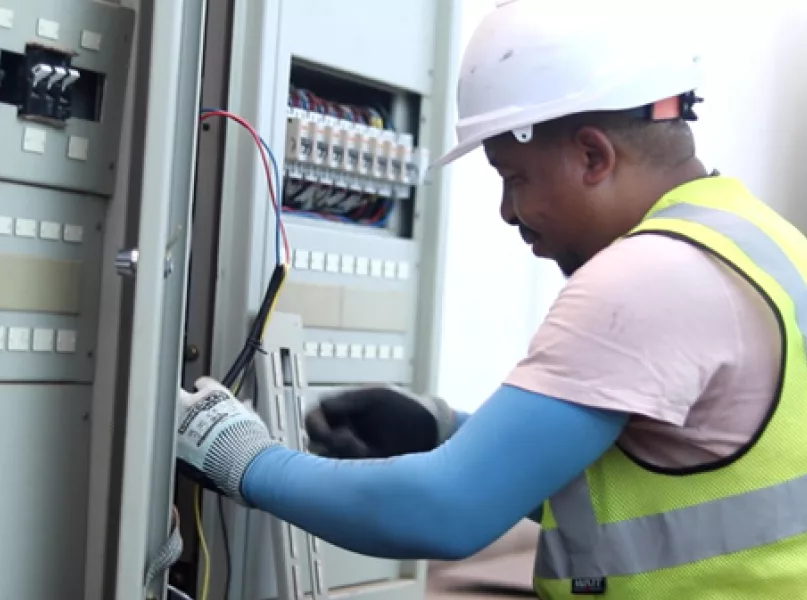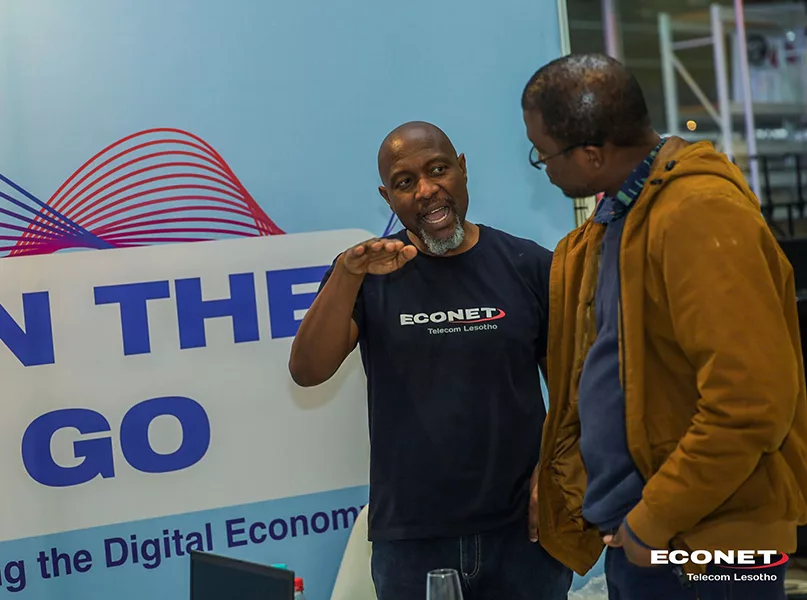Intent on reimagining and rejuvenating its nation’s telecommunications industry, Econet Telecom Lesotho offers voice and data services through different technologies to ensure widespread, quality network coverage across the enclave. Dennis Plaatjies, Chief Executive Officer, and Malefetsane Tlelima, Chief Technical and Information Officer, share the company’s full story.
TRANSFIGURING TELECOMS
The African telecommunications (telecoms) sector is the world’s second-fastest expanding market after the Middle East, as mobile broadband is driving exceptional growth in the industry, with over 60 percent of mobile connections in Africa now being broadband.
Mobile money, mobile health, and other digital services are gaining popularity in Africa’s telecoms market, as the continent’s governments and authorities continue to take a proactive approach to promoting the burgeoning industry, with initiatives such as the African Union’s Digital Agenda and the formation of the African Telecommunications Union.
“The telecoms business in Africa is continuously growing and fascinating to work in, with numerous recent trends and developments,” opens Malefetsane Tlelima, Chief Technical and Information Officer at Econet Telecom Lesotho (ETL).
At present, 5G is still in a state of infancy across Africa and is projected to change the collective telecoms market by allowing previously inconceivable applications and enabling connections that have been historically unimaginable.
Alongside this, artificial intelligence (AI) is becoming increasingly essential in the telecoms industry, with operators employing the technology to improve network performance, optimise operations, and improve the consumer experience.
Meanwhile, the Internet of Things (IoT) is another rapidly growing field, with operators utilising its unique ability to link and control a wide range of devices, sensors, and equipment.
“The African telecoms sector offers significant prospects for expansion, innovation, and impact. I feel the industry is on track for continued success, and I am delighted to be a part of it,” he enthrals.
ETL is a leading telco in Lesotho, providing a wide range of products and services to customers throughout the country. Some of the company’s main innovations include mobile voice and data services, fixed-line voice and data services, and enterprise solutions.
As such, ETL provides customised enterprise solutions to businesses in Lesotho, including networking and cloud services. Additionally, mobile money service, EcoCash, offered by ETL’s subsidiary, Sasai Econet Financial Services, remains highly popular, with hundreds of thousands of registered users and a wide range of innovative features and services.
With a strong presence in both urban and rural areas, the company’s customer base includes individuals, small and medium-sized businesses, large enterprises, and the Government of Lesotho. With a dedicated workforce of over 500 employees, ETL remains committed to providing high-quality products and services to customers throughout the nation.

UPGRADING LESOTHO
ETL is a subsidiary of Econet Wireless International (Econet), which was founded in 1993 by businessman and philanthropist, Strive Masiyiwa.
The current iteration of the company came into being following the merger between Telecom Lesotho (TL) and Econet Ezi ~ Cel Lesotho (EEC) in 2008. Eskom Enterprises sold its 70 percent shareholding to Econet Wireless Global, making Econet a majority shareholder, while the Government of Lesotho remained owner of the remaining 30 percent.
This game-changing merger facilitated the provision of both fixed and mobile services to fall under one operating licence, regulated by the Lesotho Communications Authority.
ETL is a locally managed and operated telecoms company and has nurtured an enviable reputation for being a more customer-centric and locally focused brand. The business has become well known for its strong commitment to corporate social responsibility (CSR) and community involvement.
Furthermore, ETL now exists as a leader in innovation and enterprise solutions, offering services nationwide to both businesses and individuals.
To date, the company has invested heavily in network enhancements and robustness, including increased power autonomy and data centre redundancy. This investment is intended to provide high service availability as well as resilience in the face of disasters and cyberattacks.
The technologies that ETL is currently implementing across the nation include its global system for mobile communications (GSM), and its signature product, Econet fibre.
So far, the company has covered all major towns with 4G LTE and 3G networks, while the Maseru suburb also now enjoys full 4G LTE coverage. ETL is now implementing its deployment plan for 5G technology in major towns.
The company’s ongoing network expansion enables it to offer innovative products and services at competitive rates and consistently improve the customer experience.
This falls under the umbrella of its fibre-to-the-home roll-out initiative, whereby ETL is increasing its coverage to include all major districts and delivering broadband connectivity to the rest of the country, which was previously only available in Maseru.

CREATING A FAMILY NETWORK
ETL believes that empowering its employees is critical to fostering innovation, growth, and success throughout the business. To achieve this, the company employs several initiatives to empower its personnel.
By providing numerous training and development opportunities, ETL gives its employees access to a variety of growth options, such as on-the-job training, workshops, and courses to help them improve their skills and knowledge and advance their careers.
By giving employees control of their work, the company provides its staff with the authority and flexibility to own their work and make decisions that benefit both ETL’s customers and the overall business. This helps to boost company-wide confidence, involvement, and motivation.
“We encourage our staff to think outside the box, experiment with new ideas, and take measured risks. We have a strong innovation culture, and we believe that allowing our workers to be creative and think imaginatively is critical to driving corporate growth,” acclaims Dennis Plaatjies, Chief Executive Officer at ETL.
Today, the company has various recognition programmes in place, including employee of the month awards, staff anniversaries, and performance-based incentives.
“We believe that acknowledging and rewarding employee contributions is critical to developing a positive and motivated workforce,” he confirms.
“We have a strong innovation culture, and we believe that allowing our workers to be creative and think imaginatively is critical to driving corporate growth”
Dennis Plaatjies, Chief Executive Officer, Econet Telecom Lesotho

PROUDLY SOCIALLY RESPONSIBLE
As a corporate citizen, ETL becomes part of the solution when the lives of communities in which it operates are threatened.
The company contributed immensely towards the solutions to the COVID-19 pandemic by providing free telecoms services to the autonomous organisation formed by the Government of Lesotho to coordinate and implement an effective response plan.
Every year, ETL also provides meals and donates raw groceries at Christmas to chosen orphanages in the country.
“Christmas is a time for giving and spending quality time with family, so the purpose of the initiative is to serve delicious meals and spend time with the children living at the orphanages,” Plaatjies tells us.
The broader Econet group wholly owns a foundation called HigherLife Foundation Lesotho (HLFL) which has been operating since 2011. Education is one of the six pillars that guide HLFL’s activities.
“Additionally, ETL has been sponsoring rugby in Lesotho for close to two decades. A strong relationship between our company and the Federation of Lesotho Rugby (FLR) was formed through an initial request for a set of rugby kits,” he details.
Similarly, ETL has since been supporting the Lesotho Rugby Academy. The academy’s main focus is to develop grassroots rugby in Lesotho and use the sport as a vehicle for life skills coaching at schools.

RESPONSIBILITY AT THE CORE
Telcos such as ETL look to minimise their carbon footprint and contribute to the global fight against climate change by powering their networks and infrastructure with renewable energy sources like solar, wind, and hydro power.
As energy efficiency is crucial to lowering the telecoms industry’s environmental impact, companies may drastically cut their energy usage and carbon emissions in future by investing in energy-efficient equipment and implementing energy-saving strategies.
“We can minimise our environmental effect by minimising waste and introducing recycling programmes, as well as reducing e-waste by recycling and properly disposing of used technologies like cell phones and batteries,” Tlelima shares.
“Overall, we are responsible for acting in a sustainable and environmentally beneficial manner. By embracing these practices, as an entire industry, we can lower our environmental impact, contribute to the worldwide battle against climate change, and foster consumer trust and loyalty,” he concludes boldly.































